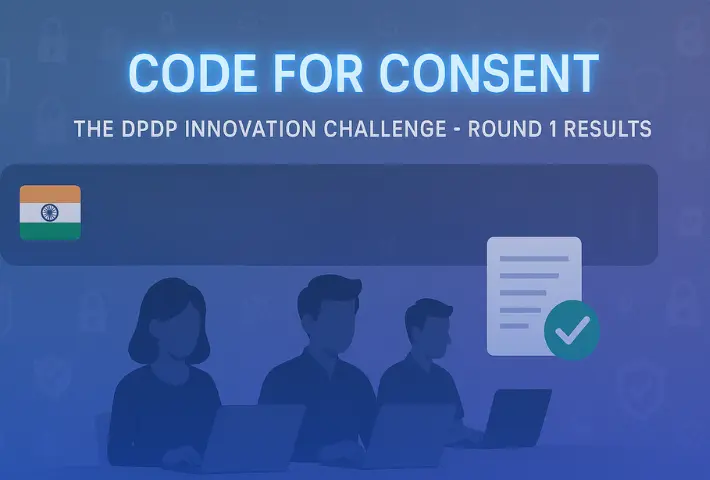Ensuring strong data protection India has become crucial for businesses. A key principle is purpose limitation, which means personal data must be used only for the reason it was collected. Under India’s new Digital Personal Data Protection Act (DPDPA) 2023, this rule is explicit. In simple terms, a company can collect your data only for a specific, lawful purpose and cannot later use it for unrelated reasons. This blog explains purpose limitation in plain language, its role in Indian data privacy law, and what businesses must do to comply. We’ll cover how purpose limitation works under the DPDP Act, why it matters, practical examples in sectors like e-commerce and healthtech, a brief GDPR comparison for context, and tips to stay compliant.
What Is Purpose Limitation in Data Privacy?
Purpose limitation is a fundamental privacy concept. It requires that any personal data collected by an organization be tied to one or more clearly defined purposes, and that the data not be used for anything else. For example, if an online retailer collects your address to deliver a package, purpose limitation says they cannot then use your address for direct marketing or share it with advertisers without getting your explicit permission.
This principle is built into many privacy laws worldwide. Under the EU’s GDPR, Article 5(1)(b) states that personal data “should be collected for specified, explicit and legitimate purposes and not further processed in a manner that is incompatible with those purposes”. In other words, once data is collected for a declared purpose, any new use must be compatible with that purpose or require fresh consent. For instance, further processing of data for scientific or historical research is allowed under strict safeguards, but simply using customer contact details for an unrelated promotion would violate purpose limitation.
Purpose Limitation under India’s DPDPA 2023
India’s Digital Personal Data Protection Act 2023 (DPDPA) firmly enshrines purpose limitation as a legal requirement. The Act defines key terms like “specified purpose” and outlines how data can be processed. Under Section 6(1) of the DPDPA, any consent collected from a user must be for a specified purpose and limited to data needed for that purpose. In concrete terms, a business asking for consent must only gather information strictly necessary for the stated purpose. The law even gives an example: if a telemedicine app asks for permission to access a user’s contact list (which is irrelevant to providing medical advice), that part of consent is invalid and must be ignored.
In addition, the DPDP Act requires data fiduciaries (organizations handling data) to follow certain principles. One guiding note on the new law explicitly says personal data “usage… is to be limited to the purpose for which it was collected”. In other words, the DPDPA makes clear that data minimization and purpose limitation go hand in hand. You only collect the data you need for your specified goal, and you only use it for that goal.
In short, the DPDPA demands that Indian businesses:
- Clearly state each purpose of data collection in notices to users.
- Collect only data necessary for those purposes (data minimization).
- Use data only for those purposes unless new permission is obtained.
- Delete or stop processing once the purpose ends.
These rules mirror global standards. As one privacy expert notes, “similar to GDPR, the DPDPA imposes a purpose limitation on collected data – the data may only be used for the specified purpose pursuant to which it was collected”.
Why Purpose Limitation Matters for Indian Businesses
For Indian companies, purpose limitation has real impacts on how data is handled. First, it enforces accountability: you must define why you are collecting each data point. This prevents businesses from hoarding information and then using it for “secondary” purposes without consent. It also reduces privacy risk – by not using data beyond its need, there’s less chance of a privacy breach or misuse.
Put simply, if your business cannot clearly explain why it needs a piece of personal data, you shouldn’t collect it in the first place. This builds consumer trust: users are more willing to share data when they know it will only be used in specified ways. Compliance also avoids confusion. As an industry guide observes, the DPDPA mandates “purpose limitation in data usage” as part of stricter data handling protocols. In practice, this means businesses in every sector – from small startups to large corporations – must update their privacy policies and consent forms to clearly mention all purposes.
Failing to respect purpose limitation not only breaks the law but can harm your reputation. In India’s emerging data protection regime, regulators will expect companies to follow these principles. Experts highlight that Indian law “reflects key privacy principles such as purpose limitation” just like the EU’s GDPR. Thus, abiding by purpose limitation is not an option but a compliance obligation for any organization processing personal data in India. It shows customers and regulators you take data protection seriously.
Industry Examples: How Purpose Limitation Works in Practice
To see purpose limitation in action, consider how various Indian businesses might apply it:
- E-commerce: Collects name, address, and payment details to fulfill orders. Data must not be reused for ads or sold to partners without consent. Phone numbers for delivery updates must be deleted afterward.
- Fintech: Uses bank details and credit history for loan evaluation. Cannot repurpose data for marketing without fresh consent. KYC info must stay limited to compliance use only.
- Healthtech: Gathers medical data for consultations. Must not share with insurers or advertisers without consent. Requesting unrelated data (like contacts) is invalid.
- EdTech: Collects student info to personalize learning. Cannot use for profiling or sell to third parties. Data must be deleted once no longer needed.
These examples show that whether you’re selling goods, managing finances, delivering health services, or teaching online, the rule is the same: use personal data only for the defined purpose. If you ever need to use data for a new purpose (say, sending marketing emails instead of order updates), you must go back to the user and get separate, informed consent.
DPDPA vs. GDPR: Similarities and Differences on Purpose Limitation
India’s DPDPA and the EU’s GDPR share the same core principle of purpose limitation, but with some distinctions. Both require that data be collected for specific purposes and only used accordingly. For example, the GDPR explicitly forbids further processing that is incompatible with the original purpose, barring certain exceptions (like research under strict conditions). The DPDP Act similarly says personal data “should only be processed pursuant to specified purposes” when consent or voluntary sharing is the basis.
However, the DPDPA introduces some unique features. Unlike the GDPR, Indian law allows some legitimate uses without fresh consent. For instance, if a user voluntarily gives data for one purpose and doesn’t object, a business can continue using it for that purpose. Also, the DPDPA gives broad powers to the State for processing data (like public services) which can override consent and purpose limitation in some cases. In practice, this means government agencies may combine data for things like benefits or public welfare, which is not typically allowed under GDPR without specific authorization.
In summary, both laws emphasize purpose limitation as a pillar of privacy. They both require clear communication of purpose to users and forbid “secondary” uses without consent. For businesses, the takeaway is similar: comply with stricter rules on data use. Whether under GDPR or DPDPA, it’s good practice to treat data as off-limits for any purpose not covered in your privacy notice or consent form, unless you obtain new permission.
Tips and Best Practices for Ensuring Purpose Limitation
Implementing purpose limitation effectively means building it into your data practices. Here are some practical steps businesses can take:
- Define & Document Purposes: List all reasons for collecting personal data in your privacy policy. Ask why each data point is needed.
- Collect Only What’s Needed: Apply data minimization. Don’t collect sensitive details like gender or religion unless absolutely necessary.
- Use Clear Consent: Make consent purpose-specific and unbundled. Let users choose what they agree to. Keep records of their choices.
- Train Your Team: Educate staff regularly on DPDPA rules. Everyone should verify that any data use matches the original purpose.
- Map Your Data: Track what data you hold and where it flows. This helps catch and fix off-purpose usage.
- Set Retention Limits: Keep data only as long as needed for its purpose. After that, erase it as required under DPDPA.
- Build Privacy by Design: Include privacy checks in all new projects. Ask what’s collected and why before launch.
- Secure Vendor Contracts: If you share data with third parties, contracts must restrict them to your stated purpose only.
- Audit Regularly: Review your practices often. Make sure no team or system is reusing data in ways users didn’t agree to.
By following these best practices, businesses not only meet DPDPA compliance but also build customer trust. Remember the rule of thumb: when in doubt, check the purpose. Every team member should know exactly what purposes are allowed, and any new data use should trigger a fresh review or consent.
Penalties and Risks of Non-Compliance
Ignoring purpose limitation can have serious consequences under the DPDPA. Regulators can impose hefty fines for violations. For example, failing to take “reasonable security safeguards” (which includes respecting purpose limitation) can lead to a penalty of up to ₹250 crore (about 2% of annual global turnover). Other offenses like improperly collecting children’s data can carry fines up to ₹200 crore. These numbers show that the law is designed to be stringent.
Beyond fines, non-compliance can damage your reputation. Customers expect companies to be transparent and responsible with their data. If it becomes known that an organization repurposed data without permission, trust can evaporate overnight. In India’s competitive market, news of a privacy violation or penalty can lead to loss of business. There is also legal risk: individuals can complain to the Data Protection Board, and organizations may face legal actions or orders to halt data processing. In extreme cases, repeated violations could even trigger criminal penalties (as outlined in the law for some offenses).
Most importantly, adhering to purpose limitation avoids these risks altogether. By strictly processing personal data only for declared purposes, businesses demonstrate respect for consumer rights. This not only keeps you on the right side of Indian data privacy law, but also gives your customers confidence that you value their privacy. As one privacy analyst notes, compliance is more than a checkbox – it is a strategic advantage in a data-driven economy.
Why Purpose Limitation Is Your Compliance Lifeline
Purpose limitation is a cornerstone of India’s new Digital Personal Data Protection Act. In essence, it means “tell people why you want their data – and don’t use it for anything else.” For Indian businesses, this principle means rethinking data collection and use in every department. The rules are clear: get specific consent, limit what you gather, and erase data when the job is done. While it may require updating your practices, the payoff is protection from legal and reputational harm.
By following purpose limitation, you not only comply with the DPDPA’s requirements, but you also build customer trust. In today’s digital market, consumers choose companies they trust with their personal information. Show your customers you respect their data: be transparent about your purposes, avoid unnecessary data grabs, and use each data point only for its intended goal. That is how your business can thrive under India’s new data protection law, turning compliance into a competitive edge.
Key Takeaways: Under the DPDPA 2023, personal data must be collected for specific, lawful purposes only. Businesses should update privacy notices and consent forms to clearly state all purposes, collect minimal data, and delete it once the purpose is served. Violating purpose limitation can lead to huge fines and loss of trust. To comply, conduct a data inventory, train staff, and integrate privacy into every process. By doing so, you not only avoid penalties but also strengthen your brand by respecting Indian customers’ privacy.









